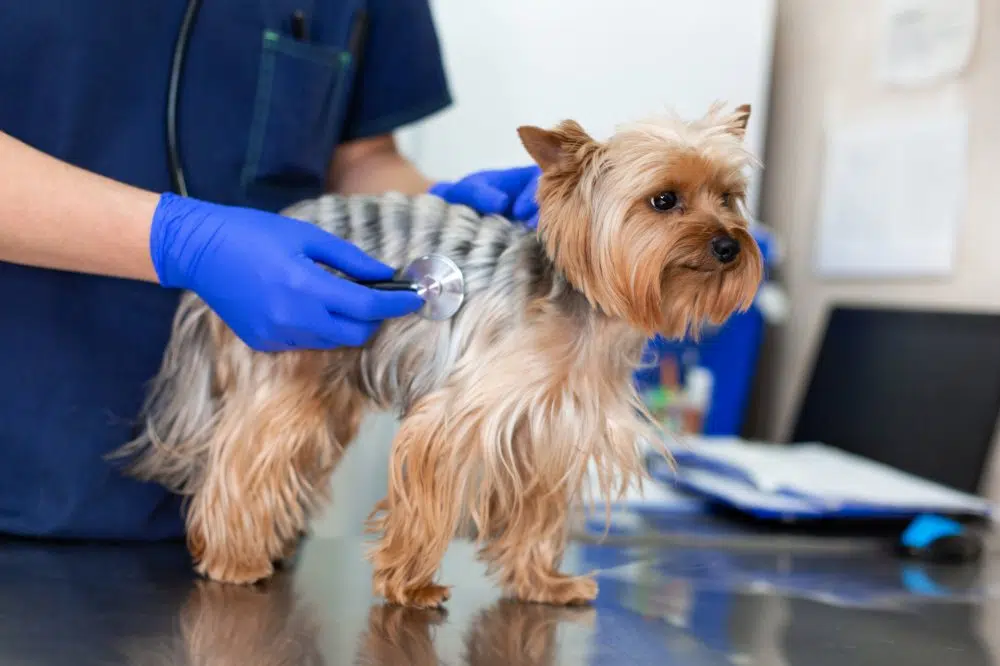Routine veterinary checkups are an essential part of your puppy’s first year. Puppys R Us guarantees the health of every puppy, backed by our Health Guarantee. Still, even the healthiest puppy can get sick or react to something in the environment. The best way to keep your dog healthy and happy is to arrange regular wellness visits to a trusted veterinarian. Your vet can recommend which vaccines are needed for your dog when they should get them and advise you on proper nutrition and care.
Annual Checkups
Every dog should have an annual veterinary checkup. Veterinarians can find minor problems before they become major health issues that could lead to serious illness. Early detection and treatment for anything from diabetes to cancer can lengthen the time you have with your dog and ensure your pup is happy and pain-free. In many situations, medication and a few lifestyle changes are all that is needed to ensure your puppy’s health.
Your Puppy’s Physical Exam
When you take your puppy to their first veterinarian appointment, the vet or a qualified technician will do a complete physical, carefully checking from head to paw, including:
- Eyes – Is there any discharge? Are the eyes inflamed or red? Does your puppy scratch or rub his eyes? Dry eyes are a concern for some breeds, as is glaucoma.
- Ears – Some dogs are prone to ear infections, especially if they spend a lot of time in the water or have long, floppy ears. Early treatment is essential.
- Mouth – Your dog’s teeth can affect its whole body. The veterinarian will check for loose teeth, cavities, gum disease, and gingivitis. Bad teeth can lead to problems with other organs. Periodic teeth cleaning contributes to good health and fresh breath.
- Skin and Coat – The vet will carefully examine your puppy’s skin and coat to make sure the skin isn’t dry, and the coat is shiny and healthy. They’ll look for mange, fleas, and other conditions that can impact your puppy’s well-being.
- Heart and Lungs – Listening to the heart and lungs with a stethoscope is the most effective way to determine early signs of heart disease or lung problems. While rare in young dogs, problems with the heart and lungs can be effectively treated if discovered early.
- Height and Weight – Your puppy’s growth will be charted each time they see the vet. Height and weight indicate whether your puppy is growing properly and on track for its breed.
- Movement – Your veterinarian will observe your puppy moving about, looking for limping, poor muscle tone, and any signs of discomfort.
Vaccines
Your veterinarian will advise you on which vaccines are appropriate for your puppy. He will also explain what each vaccine is for and the importance of getting them. Keep in mind that most canine vaccines have been around for decades and protect your pet against serious illnesses such as rabies, parvovirus, and other avoidable canine diseases. Some shots are required (including rabies vaccines), while others aren’t mandatory but may be advised based on where you live, whether you travel, and your dog’s likelihood of exposure to certain conditions.
Routine Tests for Puppies
During your puppy’s first veterinary checkup, the doctor may recommend several canine diagnostic tests. These can be used as a baseline to determine normal values. If your puppy gets sick in the future, the baseline will help determine how sick your pet is. Routine screening can detect health and breed-related illnesses before visible symptoms are noticed as your dog ages.
- Blood Work – Blood work checks for conditions such as anemia, organ impairments, diabetes, and infection.
- Urinalysis – A urine sample can indicate infection, inflammation, diabetes, crystals in the urine, and kidney problems.
- Heartworm Test – Heartworm is a dangerous parasitic disease that needs to be treated aggressively and early on to prevent serious complications. If your puppy is on a heartworm preventative, a heartworm test needs to be done whenever your puppy stops taking the preventative.
- Fecal Test – Various parasites in the gastrointestinal tract can be found in your pet’s feces, including intestinal worms. Deworming treatments, if needed, are essential to preventing diarrhea and other health problems in puppies.
Your puppy will be healthy, happy, and curious when they arrive in their new home. Because they are adjusting to a new environment, getting into everything imaginable, and growing rapidly, taking them for regular well-checks with a trusted veterinarian is essential. Your puppy’s veterinary checkup will ensure they continue to be healthy now and in the years to come.
